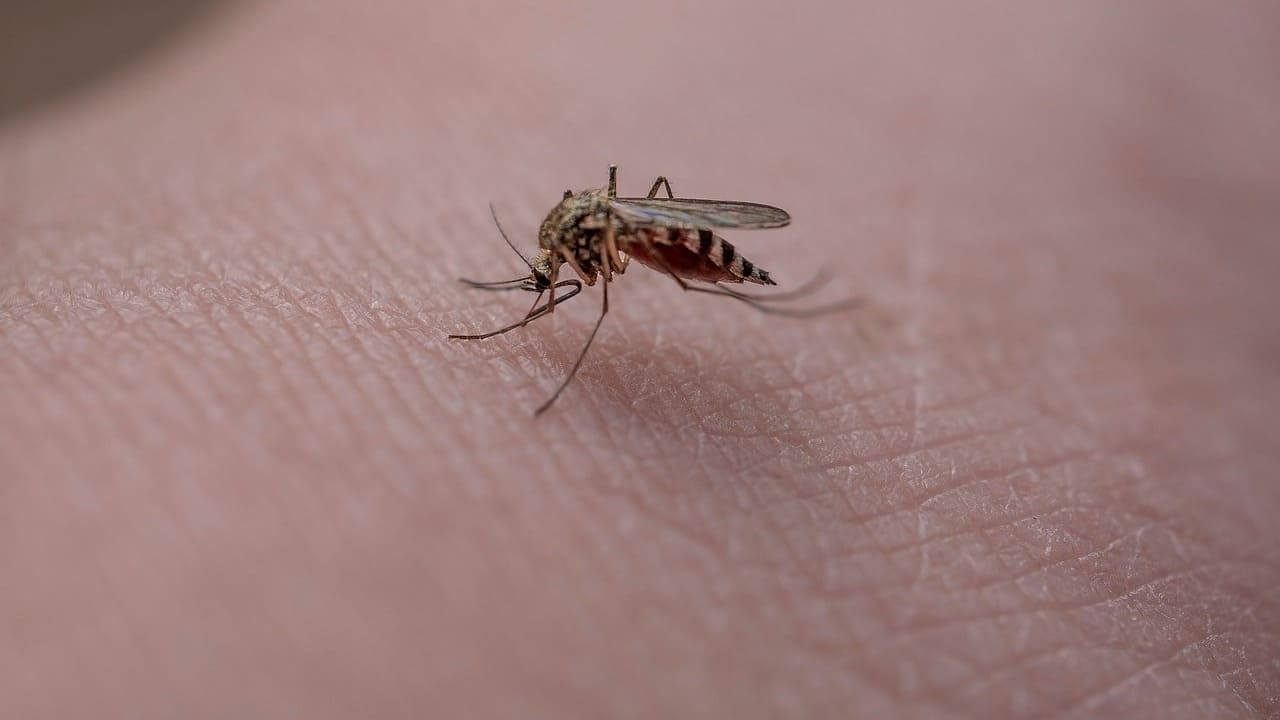How long does a mosquito live?
Many factors determine how long do mosquitoes live, including, but not limited to, species, environmental conditions, female and male tendencies, and the like. An adult male mosquito lives on average for approximately one to two weeks. Female mosquitoes, on other hand, can survive up to 30 to 50 days if conditions are favorable to them. Most adult mosquitoes are consumed by predatorial animals as food, and the majority die in a flood, drought, storm, or other natural catastrophes.
The females live longer than the males do, also because females produce eggs around which they gather sources of food. In warm, humid environments female mosquitoes are capable of living longer than one month.
Mosquitoes, like many other creatures, have a defined life cycle limited by female availability and environmental conditions. Thus, the lifespan of mosquitoes can be observed to diverge depending on geographical location. Warmer and humid climates might extend their life cycle while cooler worlds will likely produce a morose stage called diapause.
The majority of mosquitoes found in northern territories undergoes dormant like sleep state hence a hibernation, making them survive the winters. Thus, the hibernated adults have their lifespan reach up to 6-8 months.
Certain species of mosquitoes living in the Arctic and subarctic cold climates have been observed going into hibernation two times before reaching maturity which makes their life cycle take more than a year.
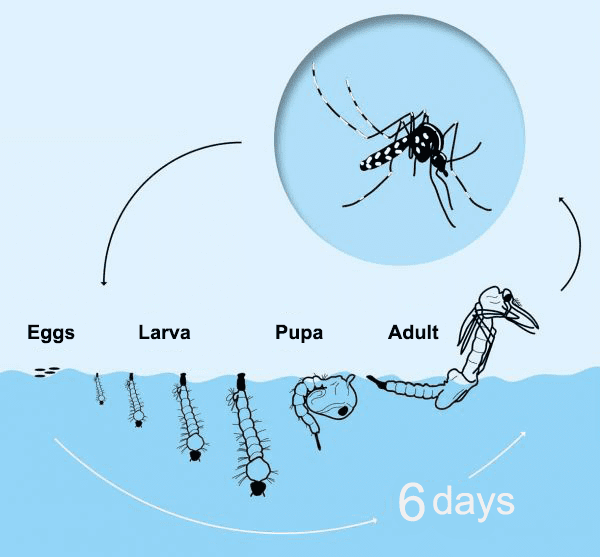
Image Credit: Surveillance Moustiques
How long does it take mosquitoes to breed in standing water?
There are different stages of mosquito lifecycle as listed below:
- Laying of Eggs: The female mosquitoes reproduction cycle starts after after a blood meal, and they they start laying eggs.
- Hatching: After being laid, the mosquito eggs hatches into larvae within 24 to 48 hours.
- Larval Stage: The larvae, often known as ‘wrigglers’, feed on detritus and small organisms present in the water and go through several molts during their growth stage. This larvae progresses into pupae which takes 4-10 days.
- Pupal Stage: The stage of larvae to pupa takes much longer averaging 1 to 3 days.
- Adult Mosquito: Adult mosquitoes appear few hours after larvae changes to pupa wherein they become capable of flying.
Mosquitoes can breed in almost any amount of water, even as little as one teaspoon of water. In ideal circumstances, from the laying of the eggs to the whole adult stage, the length of the time required is estimated to be about 7-10 days.
How long for mosquito to become adult?
Generally, a mosquito takes 8 to 10 days to mature from the egg stage, with some variations depending on temperature and humidity conditions.
The mosquito’s life cycle starts with a single female depositing her eggs in stagnant water body such as in a garden pond, or uncovered tank, or any small puddle of water where no time becomes motion. The eggs given rise to will contain mosquito larvae which stay in the water feeding on organic debris, for nearly a week.
The hatching of eggs into larvae may take around 48 hours in peak summer season. These larvae undergoes multiple molting process and grow bigger and bigger. This hatching of egg and transformation into larvae with multiple molting process, take around 4 to 10 days.
Finally at the pupa stage, where these larvae do no feed but undergo transformation into an adult stage, takes around 1 to 3 days. The adult mosquito, comes out of the pupa stage and get away from the water to begin its life in the air, within few hours of emerging as adults.
The complete cycle from the deposition of eggs to the maturation of a fully grown adult female mosquito takes about 8 to 10 days, which can be shorter duration particularly when it is peak summer season.
How long do mosquitoes live after hatching?
After hatching (which may takes around 48 hours under favorable conditions of temperature and humidity),
- the mosquito develops into a larva and grow into a pupa, which takes 3 to 8 days.
- and then this pupa transforms into an adult mosquito, which almost takes around 1 to 3 days.
- the adult male mosquito than live around 1 to 2 weeks, while the female mosquito may live up to 30 days or even more than a month.
Thus after hatching, the mosquitoes develops through different stages of its lifecycle and finally after becoming an adult mosquito their lifespan depends on their sex and other favorable conditions as given above. Also, consider the climatic conditions where mosquitoes may go into hibernation stage, thus extending their lifecycle.
How long do mosquito eggs last?
The mosquito eggs may last from several days to a few weeks. The eggs hatches into larvae, which takes around 48 hours. But, it totally depends on the species of mosquito and environmental conditions. There are some species of mosquito like Aedes aegypti, where they can lay eggs which can survive to several months in dry conditions. These eggs enters a state of dormancy, and once they come in contact of water they start hatching.
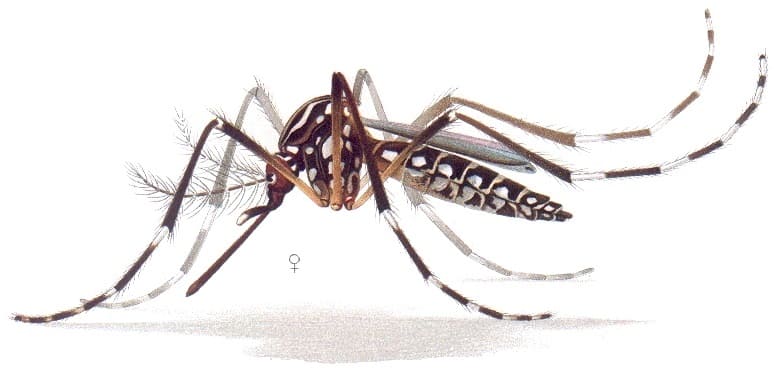
Image Credit: Wikimedia Commons by Detail from the original by Emil August Goeldi | Content License
The mosquito eggs are quiet resilient and adaptable as they can survive fluctuations in humidity, temperature, and other environmental conditions. Because of this they can survive in drought, cold or and can only hatch when favorable conditions are met. This adaptability makes it difficult to control their population as they can lay eggs in hidden and hard to reach areas and remain as dormant, that can hatch later.
This can truly spoil all previous control measures implemented before to eradicate their population in particular region.
How long do mosquitoes live without food?
Mosquitoes are able to go without food for a certain duration which is varied due to some factors such as their type, sex, or even some environmental conditions. A blood meal is a must for the adult female mosquitos whose role is to lay eggs and therefore should look for such hosts.
These female mosquitoes can survive for a span of at least two weeks which may extend to about three weeks without blood meals. However, they still are in need of sugar as a substitute nutrient and therefore they can depend upon nectar and other vegetative sources for nutrition.
While male mosquitoes, which do not feed on blood have to entirely depend on nectar and alternate sources of sugar from plants. These male mosquitoes can live for around 1 or 2 weeks as per environmental conditions.
In colder regions and winter seasons, the mosquitoes may slow down their rate of metabolism, where they can survive even longer without food. However, in hot and dry conditions their lifespan get shortened.
In hibernation stage during cold weather, female mosquito may survive as long as 6 months without food. Once they get out of hibernated stage they need food more regularly for breeding.
If these mosquitoes gets trapped or unable to get food for some reason they are likely to die within couple of days.
How long do mosquitoes live without blood?
Male mosquitoes do not bite or live on blood meals. They solely rely on sugar sources like nectar and plants. Only female mosquitoes bite and sucks blood from humans and animals, as they need energy to lay eggs for breeding.
These female mosquitoes are able to exist without such nutrients as blood for a period of around two to three weeks. Still, like male mosquitoes, they will need sugars for energy and, in the absence of such vital sources, male and female mosquitoes will perish within a timeframe of two to four days. This is why male and female mosquitoes have to search for certain food sources such as nectar or juices of plants or else they will perish.
How long do mosquitoes live indoors?
House environments are more static and ideal as there are no enemies so they may live longer in indoors.
We only consider the females as they do blood-job while the males are of no concern to humans. Typically female mosquitoes can live for a month or two (which again depends on species), under favorable conditions like consistent access to food and no predators. But if they gets trapped or kept inaccessible to any food supply or blood, they can die in few days.
Also talking about male mosquitoes they typically live around 1 or 2 weeks, under favorable conditions like access to food and no predators. But they as well die soon in couple of days, if they didn’t get any source of food.
How long do mosquitoes live inside a house?
Depending on the environment, mosquitoes can fasten themselves into a house for about one to two weeks, but under favorable conditions, there can be an increase in this duration to several weeks even.
Under favorable conditions like consistent source of food (nectar or blood), humid and warm environment, they can survive inside a house for up to a month or even longer than that.
Your house has a number of spots there for mosquitoes to hide themselves. There are dark and humid conditions under the sink, behind closets, at garage and laundry rooms. There you can also find water sources, like plant pots, bird baths, leakages, etc.
The stable environmental conditions inside a house without any predators and harsh weather conditions, the mosquitoes live typically longer inside a house than outdoor environment.
Also, the eating habits or foods that we eat can helps the mosquitoes to find and locate us. And it becomes easier for them to get consistent access to food inside a house.
How long do mosquitoes live after they bite you?
The female mosquito is the only one who can bite us. The male does not bite. The female mosquitoes can live up to 15 days without human blood. But though after biting you they can live, they still need sugar as a source of food to survive.
These female mosquitoes need blood to develop their eggs and continue to reproduce. Once they bite you, they take rest and allow eggs to develop and mature. Than they start seeking another blood meal or lay eggs to reproduce. Given the right conditions, female mosquitoes can bite, lay eggs more than once throughout their lifespans, as is their nature.
How long do mosquito bites itch?
Most of the time, the mosquito-bite itch only lasts for one or two days after the mosquito bite. But why do we itch? This is in simple terms a body’s immune reaction. It is however a fact that mosquitoes always inject some of their saliva during the bite. This saliva has an anticoagulant property which elicits an immune response to the site of biting which results in red or swollen areas sometimes with blisters.
It is a harmless condition that lasts for a few days during which the area is itchy and resembles a lesion. Most often it resolves on its own in a day or two.
However, if the individual shows sensitivity or any allergic reaction or if there’s some infection due to excessive scratching than the itch and discomfort may persist longer and take more time to heal, sometimes a week or more.
Also, if there are multiple bites or more than one bite in the same area, it can make the itch more severe and frustrating.
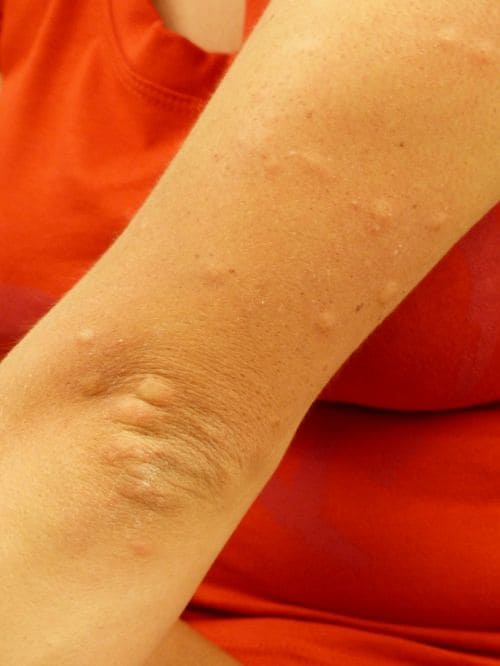
Image Credit: Needpix.com, by Hans | Content License
How long do mosquitoes stay out at night?
Mosquitoes prefer darkness and they are most active in between evening and night. Most mosquito species are crepuscular as like nocturnal animals. They are active in dark from dusk to dawn, and then hideaway during sunlight. Their activity is at peak during the warmer parts of the evening, like early evening at time of sunset.
Their activity can lasts throughout the night in the dark where they seek blood meals from hosts like humans at outdoors and terraces, dogs near their pan, chicken in the coop, etc.
How long to wait after mosquito spraying?
After mosquito spraying it is advised to wait for atleast 30 to 60 minutes before re entering the treated area. This will allow the insecticide to settle on surfaces, reducing its concentration in the air, which otherwise gets inhaled and become more hazardous.
Once the chemical gets dry the chances of skin contact gets minimized. Wearing protective gloves and masks is advised if you are assisting the spraying process or your self spraying the insecticide. Also, read the manufacturers instructions beforehand to avoid any health related risks.
Sometimes, people prefer natural mosquito repellent sprays that are free of toxic chemicals but not long lasting and effective to that extent.
How long do mosquito bite bumps last?
The mosquito bite bumps last for 1 to 3 days. This is actually our immune systems response to mosquito’s saliva. The itching and redness is maximum in the first 24 hrs. which later subsides slowly on its own.
Chronic scratching of the skin may result in bacterial infection and increase persistent itching. In severe cases, areas exposed to chronic itching can take longer than one week for them to heal.
In order to facilitate healing and prevent scratching, we could consider the use of anti-histamines, anti-itch creams or even applying a cold compress or ice to the areas of the bite bumps.
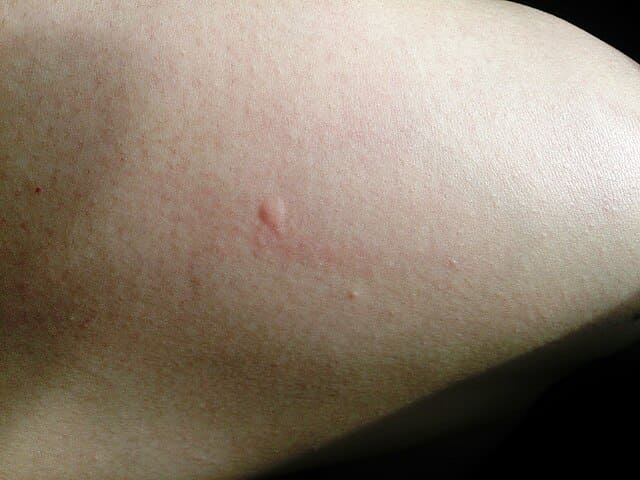
Image Credit: Wikimedia Commons by ProjectManhattan | Content License
How long does it take for mosquito bites to show up?
Mosquito bites show up in first hour of bite itself. Mainly when the proteins present in the saliva of mosquito reacts with the blood, and in reaction our immune system releases histamines, which causes redness, itching and bumps at the bite site. In few hours, most immune responses reach their maximum point, although complete responses “peak” and often take 24 hours.
How long does it take to get rid of mosquito bites?
As already discussed the time taken to heal from a mosquito bite depends on various factors including the degree of the condition and its chronicity, these are the remedial measures that can be taken:
- Immediately after bite: The mosquito after biting flew away, but the histamines released by our immune system causes redness, bump, and itching which starts showing up in the first few hours.
- Time to diminish: The symptoms like redness, itching and discomfort, starts diminishing within 24 hrs. As the body’s immune system subsides the itching and bump normally disappears in a day.
- Extended due to Infection: If the bite is scratched excessively, there are chances of infection which may take more than a week to heal. Some other allergic reactions in certain individuals can also, extend the symptoms for longer duration.
- How to get rid of it: Anti histamines, anti-itch cream and cold compresses can assist in quick recovery. Complications such as infection can occur because of self-inflicted scratching of the multiple bite areas.
How long does mosquito spray stay in the air?
It takes 30 minutes to set mosquito spray on the surfaces. The concentration of insecticides increasingly becomes unsafe to health because they can be toxic if huffed, or if the person comes into contact with skin surfaces rubbed with them. As a precaution, time frames of over 30 minutes should be observed before returning to treated areas.
Also, the type of spray used and environmental factors decides the duration of sprays in the air, as shown below:
- Aerosol Sprays: Chemical sprays containing DEET or Pyrethroid are effective in the air but only for a limited time, somewhere between 15 and 20 minutes. Their distribution and coverage is the maximum at the time of application, but it significantly decreases when the spray disperses and settles upon surfaces.
- Foggers: These devices releases insecticide based fine mist which remains in the air for around 30 to 60 minutes. It is more effective in controlling or preventing mosquitoes as they lasts longer in the air.
- Natural or essential oil sprays: Sprays synthesized from essential oils such as citronella or eucalyptus remain suspended in the air for much lower time, about 15 minutes at the most before they evaporate completely.
Additionally, the wind, as it moves the repellent spray faster, also supplements the drying of the spray as well as the humidity that tends to trap the repellents can also be considered in the context of mosquito repellent sprays.
How long is the mosquito season?
The length of the mosquito season varies according to the region and climatic condition.
- Cold / Temperate regions: In colder regions, the mosquito season starts from May and lasts till September. The mosquito breeding starts when the temperature goes above 10o C. The mosquito season is at peak in the warmer months.
- Warm / Tropical regions: In South Asian countries where the climate is warm, the mosquito season may extend for the entire year. This of course is attributable to the high temperature and the amount of precipitation received and is relatively consistent.
The weather patterns play an important part since a combination of low temperature and low humidity may result in shortened mosquito season whilst higher temperatures and high rainfall amounts may cause mosquito season to be prolonged significantly.

